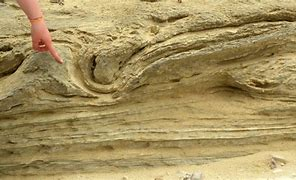"Prediction: paraconformities, or ‘flat gaps’, should be rare due to due to the extended timeframe of deposition of the layers, which should mean that there is ample time for erosion of the surfaces of underlying formations.
However, the boundaries between layers often show no signs of erosion. Flat gaps are common.
Prediction: there should be little evidence of large-scale folding of soft sediments involving many strata. Again, this expectation arises from the extended timeframe assumed, which means that the lower layers at least should be solid rock at the time of the bending. However, extensive folded sedimentary rocks around the world argue for their being soft before folding.
Prediction: sedimentary strata should have limited geographical extent due to the localized nature of depositional processes (i.e. no global flooding cataclysms).
However, continent-wide sedimentary formations are common, even extending between continents. There are six sequential ‘megasequences’ in the Phanerozoic (fossil-bearing strata) that are global in extent.
Prediction: there should be no carbon-14 in coal, oil, or diamonds that are supposed to be many millions, or even billions, of years old, but it is consistently detected above background levels. That’s because carbon-14’s half-life is only 5,730 years, and it should have decayed below the detection limit after about 100,000 years. Not only that, but coal samples ranging in evolutionary ‘age’ from 37–318 millions of years all proved to have the same amounts of carbon-14 (consistent with all the coal samples coming from plants buried during Noah’s Flood).
Prediction/claim: regarding the age of planation surfaces: “most of it is no older than Pleistocene” (less than two million years). This was based on the observed pervasive effect of the rate of erosion processes today that would not leave any flattish surfaces flat for long, especially when there is a variety of rock types differing in hardness. And yet, based on the evolutionary deep-time paradigm, there are now said to be many ‘very old’ planation surfaces. For example, the Kimberley Plateau of north-west Australia is said to be older than 540 Ma! Encyclopaedia Britannica notes: “There has been much scientific controversy over the origins of such surfaces.” Indeed so. The global Biblical Flood in Noah’s time would explain them nicely!
Expectation: bioturbation (mixing of sediments due to the activity of marine organisms) should be evident throughout the major fossil-bearing strata (Phanerozoic). This expectation arises out of the experimental observation that marine burrowing animals, which are evident throughout the Phanerozoic, thoroughly mix sediments to 10 cm depth or more within hours. Thus, if sediments were deposited at the very slow rate needed to match the deep time dating of the strata, they should all be thoroughly mixed; there would be almost no layering evident. This is not the case at all; a major fail." CMI

